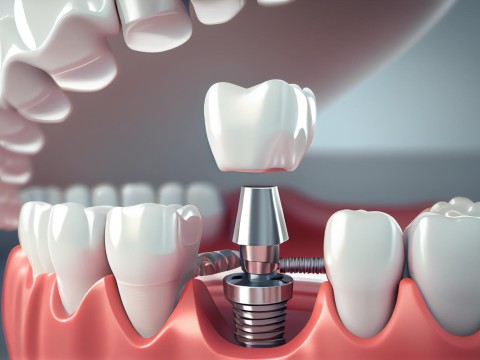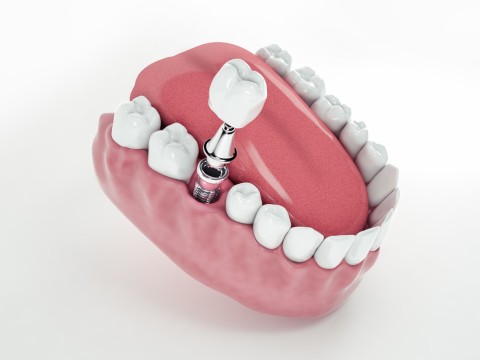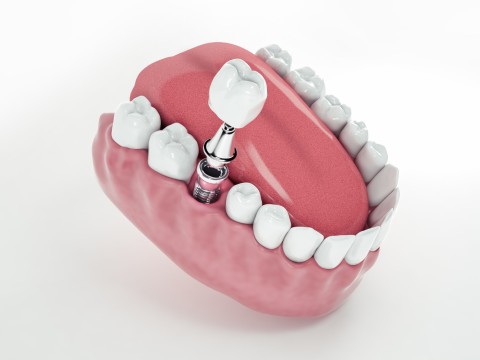What is the treatment of implants?
Implant treatment involves the surgical replacement of a lost or destroyed tooth with an artificial dental implant. A dental implant is a small titanium post placed into the jawbone, which serves as a root for a replacement tooth, bridge, or denture. Over time, through a process called osseointegration, bone integrates into the implant to provide a stable and permanent foundation for restorative dentistry. This is the best treatment for patients who have lost teeth due to injury, decay, or other factors and are looking for a long-lasting, natural-looking solution.
Types of Dental Implants
There are several types of dental implants, each suited for different needs:
Endosteal Implants: These are the most common type, inserted directly into the jawbone. They can support individual crowns, bridges, or dentures.
Subperiosteal Implants: These are placed under the gum but above the jawbone and are utilized when a patient has insufficient mass in the jawbone to support implants of the traditional kind.
Zygomatic Implants: Used when the upper jawbone is too weak to support an endosteal implant, anchorage is obtained with the use of the cheekbone.
Benefits and Recovery
Dental implants have a lot of advantages: natural-looking, enhanced comfort, improved speech, and restoration of full tooth function. Dentures may slip and require adhesives, whereas dental implants provide the added stability and confidence of natural teeth. Recovery time varies with each implant treatment, but the initial healing time generally takes a few months for osseointegration. While postsurgery care is important to ensure that no complications, such as infection, set in, when healed, implants are designed to last for many years with proper care and maintenance.
- All on 4 Implant
- All on 6 Implant
- Amalgam Fillings
- Bone Graft
- Composit Filling
- Composite Bonding
- Dental Cleaning
- Dental Crowns
- Dental Filler
- Dental Veneers
- Denture Repair
- Detertraj (tooth stone cleaning)
- E-Max Veneer
- Endodontics
- General Dentistry
- Gingivectomy
- Gum Disease Treatment
- Gum Lift
- Hollywood Smile
- Orthodontics
- Health Insurance
- Online Healthy Life Assistant 9/5
- Post - Experience Follow Up 6 Month
-
Extra Privileges
- Transfer
No suitable hotel found for the relevant dates!
- Health Insurance
- Online Healthy Life Assistant 24/7
- Post - Experience Follow Up 1 Year
- Pre-Treatment Doctor Consultation
-
Extra Privileges
- Transfer
No suitable hotel found for the relevant dates!
 Private
Private
- Health Insurance
- Healthy Life Butler
- Post - Experience Follow Up 2 Year
- World-Famous Doctor Consultation
-
Extra Privileges
No suitable hotel found for the relevant dates!
* Price varies depending on extra and upgrade selections.
Dental implants refer to artificial tooth roots positioned on the jawbone to anchor prosthetics securely. This innovative dental treatment effectively addresses the issue of missing teeth in patients. The primary rationale behind opting for screws, typically crafted from titanium, lies in their durability and compatibility with human biology.
Before embarking on dental implantation, an evaluation of its suitability is imperative. Since implant screws come in specific lengths and thicknesses, the application site should allow for the appropriate dimensions. The resilience of the jawbone and the health of the gums also play a pivotal role. Through an examination and X-rays conducted by a specialized dentist, the suitability of the patient for the treatment is determined.
Typically, the procedure is completed within half an hour to a maximum of 1-2 hours. For patients receiving permanent prostheses, the condition of the mouth and teeth is monitored for 1 to 3 months after the implant, and the prostheses are attached, completing the treatment. The full healing process usually takes approximately 3 months for lower jaws and 6 months for upper jaws.
Dental implant treatment is suitable for adults who have completed their physical development, as it involves the jaw and bone structure. Patients under the age of 18 are not recommended for this treatment due to the ongoing maturation of face and jaw structures. There is no upper age limit for implant treatment, provided that the patient's gums and jaw bones are in good health, and their general health condition allows for anesthesia.
- Provides a long-lasting and secure solution - Enhances the durability of prosthetics - Achieves a realistic appearance - Adapts seamlessly to natural teeth - Impacts smile and, consequently, self-confidence - Diminishes bone resorption in the treated area - Improves comfort in biting, chewing, and eating.
Success rates vary based on individual factors such as health and habits. For a healthy individual with good oral hygiene and overall health, dental implants demonstrate predictably high success rates, often exceeding 90-95 percent.
All-on-4 is a trademarked treatment procedure designed to replace all missing teeth in one jaw using only four implants. This approach is particularly advantageous for patients who have experienced substantial bone loss in the posterior regions of the mouth.
Dentures cannot be transformed into implants. Implants are metal screws inserted into the jawbone to support and stabilize artificial teeth, such as dentures. It may be feasible to place implants beneath existing dentures to enhance stabilization and support, provided the current dentures are in excellent condition. Consultation with a prosthodontist is advisable for a thorough examination of existing dentures.
No, dental implants are firmly fixed in the bone and offer a permanent replacement for missing teeth, closely resembling natural teeth.
Implants are placed under local anesthesia to numb the mouth and prevent pain. Discomfort may be experienced once the anesthesia wears off, lasting a few days, accompanied by possible bruising and swelling for about a week. This discomfort is normal and can be managed with over-the-counter painkillers.
Dental implants are suitable for adults of all ages but are not recommended for those under 18 due to ongoing jaw growth.
A special, softer diet is recommended for the initial weeks after phase one of the procedure. In most cases, you can continue using dentures or temporary teeth until the completion of the implant process. Once the implants and replacement teeth are complete, they function like natural teeth.
Absolutely! Dental implants look and feel like any other tooth in your mouth. Aesthetically and functionally, they surpass other tooth replacement solutions.
Yes, dental implants can support individual crowns, bridges, or implant-supported dentures, catering to various degrees of tooth loss.
Generally, dental implant surgery is safe, routinely performed by experienced oral surgeons or periodontists.
Smokers can undergo dental implant surgery, but smoking increases the risk of complications and hinders the healing process. Quitting or reducing tobacco use is advisable before and after the procedure.
Active gum disease can impact implant success. Treating gum disease is essential before considering dental implant surgery, with suitability determined through a thorough examination by a dentist.
Though rare, dental implant failure can occur. Factors like poor oral hygiene, smoking, and certain health conditions contribute to the risk. Adhering to postoperative care and regular check-ups minimizes this risk.
During the initial healing phase, a softer diet is recommended. Specific dietary guidelines provided by the dentist should be followed, and normal eating habits can be resumed as the implants fully integrate.
Indeed, dental implants can secure and stabilize dentures, offering a more secure and comfortable solution known as implant-supported dentures.




